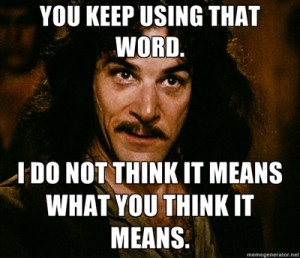 People sometimes get confused in relationships because the words and the actions don’t match or they seem not to match because people aren’t paying attention to the actual meaning of the words. Anyone who has had a conversation has experienced a few difficulties including multiple meanings of a word causing confusion for both parties, sometimes over even the subject of the whole thing, body language negating the words being used, or body language negating the entire conversation. There are times when these things are mistakes, they are unmeant, or have unforseen consequences. But most of the time they are on purpose and we need to pay attention.
People sometimes get confused in relationships because the words and the actions don’t match or they seem not to match because people aren’t paying attention to the actual meaning of the words. Anyone who has had a conversation has experienced a few difficulties including multiple meanings of a word causing confusion for both parties, sometimes over even the subject of the whole thing, body language negating the words being used, or body language negating the entire conversation. There are times when these things are mistakes, they are unmeant, or have unforseen consequences. But most of the time they are on purpose and we need to pay attention.
For example, the phrase “I’m proud of you,” is something most of us want to hear from the people who are closest to us in conjunction with some achievement we have made or some effort we are putting into an activity. When this phrase comes as a response to something expressed or at the end of an activity its a positive message which is supportive and creates connection between the parties. However, it can also be used to stop a conversation in its tracks. If someone is talking about something they love and the other party cuts in a says “I’m proud of you” the conversation is abruptly over and the person is left feeling negative about themselves because they have been silenced, yet the message is positive, isn’t it??? The meaning of the phrase has changed from supportive to dismissive with just a bit of timing.
The same can happen with “I love you.” It’s one of the most uplifting, life fulfilling phrases we have and can be made negative in a heartbeat with the addition of “, but…” It can also be changed with just a little body language. Being told “I love you” while being physically restrained, cornered, or loomed over makes for mixed signals. The phrase can also be a conversation stopper like “I’m proud of you” if it’s used to interrupt a conversation. It can be used as a signal that the other is displeased with our behavior or to warn that the other is angry over something. The words take on a myriad of meanings depending on how we use them. We can’t take them at face value.
Confusion in relationships can be cleared up to a great extent if we ignore the words, seek the meaning and match the meaning with the actions. Once the pattern is clear, then we can choose how we wish to react and what actions we will take.
